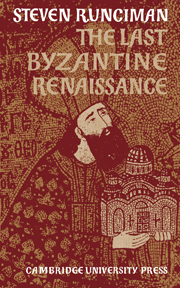1 - IMPERIAL DECLINE AND HELLENIC REVIVAL
Summary
If there is any meaning in the concept of decadence, there are few polities in history that better deserve to be called decadent than the East Christian Empire, the once great Roman Empire, during the last two centuries of its existence. It was a period when a crumbling administration, directed by an inept and short-sighted government and centred in a city whose population was rapidly diminishing, vainly attempted to ward off increasing impoverishment and the steady loss of territory. The irresponsible ambitions of its leaders encouraged disastrous civil wars. Militarily and economically the decline was rapid. The Emperor himself was poorer and feebler than most of the princes whose domains surrounded him, and he was soon to become the vassal of an infidel master. The political history of Byzantium under the Emperors of the Palaeologan dynasty is a tale of folly and misery, until at last the coup de grâce of 1453 comes almost as a relief.
Yet was it a period of decadence? In strange contrast with the political decline, the intellectual life of Byzan- tium never shone so brilliantly as in those two sad centuries. In the sphere of art the earlier Palaeologan period was of supreme importance; and if the artistic output faltered and failed as time went on, that was due to the lack of material resources, not of inspiration. It was an age of eager and erudite philosophers, culminating in its later years in the most original of all Byzantine thinkers, George Gemistus Plethon. The previous generation had produced the finest mystical exegetist of the Eastern Church in Gregory Palamas.
- Type
- Chapter
- Information
- The Last Byzantine Renaissance , pp. 1 - 23Publisher: Cambridge University PressPrint publication year: 1970



